It is important to note that your earnings and repayment capability defines the amount of loan one can take.
We discuss the various tax benefits one can have on owning multiple homes:
- Tax benefit on principal amount: Under Section 80C of Income Tax Act, 1961, the loan borrower can claim the tax exemptions of up to Rs 1.5 lacs on the principal repayment including stamp duty charges and cost of registration. The loan can be taken for various properties, but the amount of exemption is limited only to Rs 1.5 lacs in total. The other deductions that are included in the exemption are tuition fees, life insurance premium, PPF, PF contribution etc.
- Tax benefit on the interest paid: Under Section 24B of the Income Tax Act, one can claim the deduction of the interest paid on the loan, renovation, repair and construction of the house. If the house is self-occupied, then the upper limit of the deduction on the interest paid is limited to Rs 2 lacs. If the loan is taken for the construction of the property and if the construction is not completed in five years, then the limit of deduction is Rs 30,000.
If the owner owns two houses and both are self-occupied, then the owner does not have to pay the notional rental income for the properties. Tax benefit for the full interest paid can be claimed for the money borrowed once a property is considered to let out.
However, if the housing loan on the second home is more than the taxable rental income, then it can result in adverse tax situation. According to the Vaibhav Sankla, managing director, H&R block. “Till F.Y. 2018-19 they could claim the second house as deemed let-out and reduce the entire interest from the taxable rental income after adjusting property taxes and standard deduction. This would generally result in a higher loss under the head house property. The taxpayer was allowed to adjust this loss under the head house property against other income (salary, interest, etc.) up to Rs 2 lakh in the same year and the balance was allowed to be carried forward up to next 8 assessment years to be adjusted against income from house property in future years."
With the proposed amendment now, the taxpayers will not be able to claim the 2nd house as deemed or let- out. And the overall deduction for the interest deduction on the self-occupied houses is restricted to Rs 2 lacs resulting in less loss.







